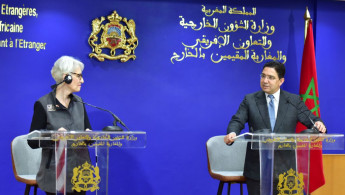US envoy's visit to Morocco triggers backlash for 'double standards' on Western Sahara, Ukraine
The US delegation's visit to Rabat has triggered backlash over the American perceived "double standards" on territorial disputes in Western Sahara and Ukraine, and on the restriction of press freedom in the kingdom.
Wendy Sherman, the US deputy secretary of state, arrived in Morocco this week as part of a regional tour. Yesterday she held bilateral political consultations with Morocco's Foreign Minister Nasser Bourita.
In a joint press statement with the Moroccan foreign ministry, the US reiterated its support for Morocco’s Autonomy Plan, describing it as a "serious" and "credible" solution to the four-decade-long conflict over the disputed territory of Western Sahara.
Morocco’s plan is supposed to allow Sahrawis to run their affairs "democratically", through legislative, executive and judicial bodies, while Morocco would retain control over defence and foreign relations.
The UN has backed the plan since 2006, but the Polisario Front, which continues to call for an independent state for Sahrawis, rejects Rabat's proposal. Some political scientists consider the plan to fall short of the international legal definition of autonomy, while reiterating the Sahrawi people's UN-sanctioned right to self-determination.
Two years ago, the US recognised Morocco's sovereignty over the disputed territory in exchange for Rabat’s normalisation of ties with Israel. The so-called Abraham Accords evoked condemnation from Sahrawis and World powers, including Germany and Russia.
During the press conference held in Rabat, Sherman expressed Washington's intention to strengthen the accords, while condemning "Putin’s premeditated, unprovoked and unjustified war on Ukraine".
As comparisons between Moroccan claims over Western Sahara and Russia’s invasion of the former Soviet state have started to surface since Rabat’s non-vote on the UN resolution against Moscow, Sherman’s apparently contradictory statements are now reigniting the debate about the US "double standards".
“How come you advocate for international legality in Ukraine and support Moroccan behaviour in Western Sahara?” tweeted Brahim, who is based in Western Sahara, according to his Twitter biography.
“Shame on you , supporting the occupier, the aggressor! Your injustice and your double standards led the world to more sufferings and more tragedies! Everything has its end!” added another Twitter user based in Denmark.
Last Thursday, eleven US Congress members from the Democratic Party had called on President Joe Biden to not conclude any significant arms deals with Morocco, amid Rabat’s "lack of assurances" that the American weapons would not be used against the Sahrawi people.
Proud to be leading a letter urging the White House to stop significant or offensive arms sales to Morocco given the lack of assurances from Morocco that the weapons will not be used against the Sahrawi people. pic.twitter.com/4Bbtyd7Ozs
— Congresswoman Sara Jacobs (@RepSaraJacobs) March 4, 2022
A day after Morocco and Israel normalised ties in late 2020, the Trump Administration notified Congress of $1 billion in weapons sales to Morocco, including four MQ-9B SeaGuardian drones and Hellfire, Paveway, and JDAM precision-guided munitions. This deal was set to move forward under the Biden Administration, as Morocco is still waiting to receive the purchased equipment.
The US envoy was also criticised for failing to tackle the alarming situation of press freedom in Morocco, as her visit came a week after the upholding of a six-year prison sentence against journalist Omar Radi. He was jailed for espionage and rape charges. Amnesty international said the trial was unfair.
During remarks in Morocco, Deputy Sec of State Sherman should have raised concerns about press freedom & the detention of Moroccan journalists. This would have sent a strong message to the palace & helped empower other journalists who remain under threat. https://t.co/TigjYKY1F9
— Seth Binder (@seth_binder) March 8, 2022
The international non-profit organisation Reporters Without Borders (RSF) said many trials against journalists are politically motivated in the kingdom. Ranked 136 out of 180 countries, freedom of press in Morocco continues to degrade due to "judicial harassment" against journalists, said RSF in its 2021 report.





 Follow the Middle East's top stories in English at The New Arab on Google News
Follow the Middle East's top stories in English at The New Arab on Google News


